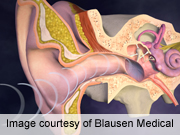- Could Your Grocery Store Meat Be Causing Recurring UTIs?
- Are You Making This Expensive Thermostat Error This Winter?
- Recognizing the Signs of Hypothyroidism
- 10 Strategies to Overcome Insomnia
- Could Artificial Sweeteners Be Aging the Brain Faster?
- Techniques for Soothing Your Nervous System
- Does the Water in Your House Smell Funny? Here’s Why
- Can a Daily Dose of Apple Cider Vinegar Actually Aid Weight Loss?
- 6 Health Beverages That Can Actually Spike Your Blood Sugar
- Treatment Options for Social Anxiety Disorder
MRI Can Be Painful, Disruptive for People With Cochlear Implants


Some people with cochlear implants experience pain, discomfort and problems with the implant’s internal magnet when they undergo an MRI scan, a new study finds.
According to background information supplied by the researchers, about 300,000 people worldwide have cochlear implants, devices which provide a sense of sound to people who are deaf or have severe hearing loss. There have been prior reports of problems among people with cochlear implants when undergoing MRI.
One expert said the problem is well-known among clinicians who care for the hearing-impaired.
“The intense magnetic field in the MRI scanner may harm the patient — dislocate the cochlear implant magnet, change the magnet’s polarity, and induce pain and discomfort at the implant site,” explained Dr. Darius Kohan, chief of otology/neurotology at Lenox Hill Hospital and the Manhattan Eye, Ear, and Throat Hospital in New York City.
“Patients must be carefully counseled prior to the MRI study to understand the possible consequences and manage their expectations,” he said.
In the new study, a team of South Korean researchers tracked the medical records of 18 people with cochlear implants who had MRIs between 2003 and 2014 at a single medical center. The MRIs included 12 brain scans and 18 scans on other areas of the body.
Thirteen patients completed their MRI scans without complications. Five patients fitted with protective head bandages could not complete their MRIs due to pain, and one of those patients also experienced displacement of the magnet in the cochlear implant.
Another patient with head bandages tolerated pain and discomfort during her third MRI scan, but experienced polarity reversal of the magnet in her cochlear implant, according to the study published online Nov. 20 in the journal JAMA Otolaryngology-Head & Neck Surgery.
“Our data clearly demonstrate that a significant proportion of patients experienced discomfort or pain during the MRI process and were unable to complete the scans,” wrote the team led by Dr. Bo Gyung Kim, of the Soonchunhyang University College of Medicine. “Therefore, in addition to device safety and image quality, patient comfort should be considered when performing MRI procedures,” the study authors concluded.
The findings should be among the considerations when discussing MRI risks and benefits with people who have cochlear implants, Dr. Emanuel Kanal, of the University of Pittsburgh Medical Center, wrote in an accompanying editorial.
Another expert in the United States agreed.
“This study reaffirms the fact that cochlear implant recipients probably should not receive MRI,” said Dr. Eric Smouha, director of otology and neurology at Mount Sinai Hospital in New York City. He stressed that, “often a CT scan is a suitable substitute, or if MRI is essential, then the magnet in the cochlear implant can be temporarily removed with a small operation.”
More information
The U.S. National Institute on Deafness and Other Communication Disorders has more about cochlear implants.
Source: HealthDay
Copyright © 2026 HealthDay. All rights reserved.










